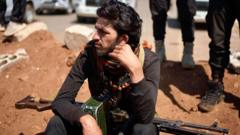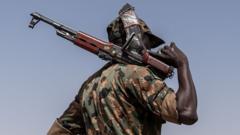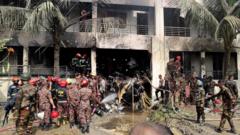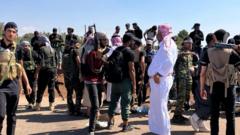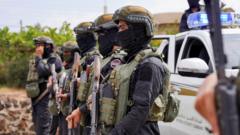Allegations of a massacre at Suweida hospital in southern Syria have thrust the violence affecting the Druze community into the international spotlight, as witnesses recount horrific scenes of indiscriminate killings by government forces.
Claims of Hospital Massacre in Suweida Spark International Outcry

Claims of Hospital Massacre in Suweida Spark International Outcry
Disturbing reports emerge of targeted killings in a Syrian hospital amid escalating sectarian violence.
Article Text:
In a shocking escalation of violence in Syria's Druze-majority province of Suweida, reports have surfaced alleging that Syrian government forces executed a massacre at a local hospital amid recent sectarian clashes. Staff members of Suweida's National Hospital have shared harrowing accounts of patients being killed in their beds as tensions reached a boiling point over a week ago.
When I arrived at the hospital’s car park, I was overwhelmed by the stench of death. The grounds were littered with gray plastic body bags, many of which were torn open, exposing decomposing and disfigured remains. Pools of blood marked the tarmac, indicative of the violence that had occurred.
"It was a massacre," asserted Dr. Wissam Massoud, a neurosurgeon at the facility. He described the brutal scene when soldiers arrived claiming to seek peace but instead killing numerous patients ranging from infants to the elderly. A video purportedly filmed immediately after the incident shows a hospital overtaken with dead bodies still wrapped in soiled sheets.
Kiness Abu Motab, a hospital volunteer, reflected on the tragedy, emphasizing that the victims’ only crime was belonging to a minority sect within a nation that should embody democracy. “What is their crime? Just for being a minority in a democratic country?” Another local, Osama Malak, recounted the shocking murder of an eight-year-old disabled boy, saying, “They shot patients in their beds as they slept.”
As reports trickle out, various factions involved in the conflict have leveled accusations of atrocities against each other, yet clarity remains elusive. Estimates of the dead from last Wednesday’s violence vary widely, with some suggesting as many as 300 fatalities, though this figure has yet to be substantiated.
The Syrian Defense Ministry acknowledged troubling reports of “shocking violations” allegedly committed by armed individuals in fatigues during the unrest in Suweida. Raed Saleh, Syria’s Minister for Disaster Management, assured that all claims of wrongdoing from all sides would be thoroughly investigated.
Access to Suweida city has been severely limited, complicating efforts to gather reliable evidence. The city appears under siege from government forces, who restrict movements in and out of the area. Damaged buildings and tank-crushed cars attested to fierce fighting that had commenced between Druze and Bedouin militants, prompting government intervention in a bid to establish a ceasefire.
As we departed from the hospital, we encountered eight-year-old Hala al-Khatib, who sat alone, bloodied and bandaged, visibly traumatized after surviving a gunshot wound to the head. Tragically, she remains unaware that both her parents were killed during the chaos.
The violence in Suweida is not just a local tragedy. It highlights the precarious and volatile state of sectarian relations in Syria, warranting urgent attention from the international community as further details of this alarming incident continue to unfold.
In a shocking escalation of violence in Syria's Druze-majority province of Suweida, reports have surfaced alleging that Syrian government forces executed a massacre at a local hospital amid recent sectarian clashes. Staff members of Suweida's National Hospital have shared harrowing accounts of patients being killed in their beds as tensions reached a boiling point over a week ago.
When I arrived at the hospital’s car park, I was overwhelmed by the stench of death. The grounds were littered with gray plastic body bags, many of which were torn open, exposing decomposing and disfigured remains. Pools of blood marked the tarmac, indicative of the violence that had occurred.
"It was a massacre," asserted Dr. Wissam Massoud, a neurosurgeon at the facility. He described the brutal scene when soldiers arrived claiming to seek peace but instead killing numerous patients ranging from infants to the elderly. A video purportedly filmed immediately after the incident shows a hospital overtaken with dead bodies still wrapped in soiled sheets.
Kiness Abu Motab, a hospital volunteer, reflected on the tragedy, emphasizing that the victims’ only crime was belonging to a minority sect within a nation that should embody democracy. “What is their crime? Just for being a minority in a democratic country?” Another local, Osama Malak, recounted the shocking murder of an eight-year-old disabled boy, saying, “They shot patients in their beds as they slept.”
As reports trickle out, various factions involved in the conflict have leveled accusations of atrocities against each other, yet clarity remains elusive. Estimates of the dead from last Wednesday’s violence vary widely, with some suggesting as many as 300 fatalities, though this figure has yet to be substantiated.
The Syrian Defense Ministry acknowledged troubling reports of “shocking violations” allegedly committed by armed individuals in fatigues during the unrest in Suweida. Raed Saleh, Syria’s Minister for Disaster Management, assured that all claims of wrongdoing from all sides would be thoroughly investigated.
Access to Suweida city has been severely limited, complicating efforts to gather reliable evidence. The city appears under siege from government forces, who restrict movements in and out of the area. Damaged buildings and tank-crushed cars attested to fierce fighting that had commenced between Druze and Bedouin militants, prompting government intervention in a bid to establish a ceasefire.
As we departed from the hospital, we encountered eight-year-old Hala al-Khatib, who sat alone, bloodied and bandaged, visibly traumatized after surviving a gunshot wound to the head. Tragically, she remains unaware that both her parents were killed during the chaos.
The violence in Suweida is not just a local tragedy. It highlights the precarious and volatile state of sectarian relations in Syria, warranting urgent attention from the international community as further details of this alarming incident continue to unfold.


